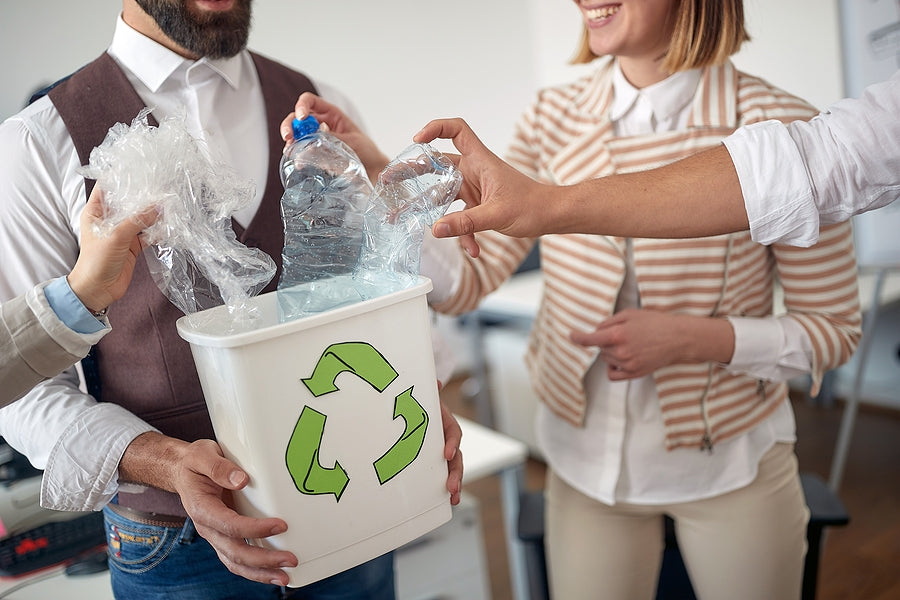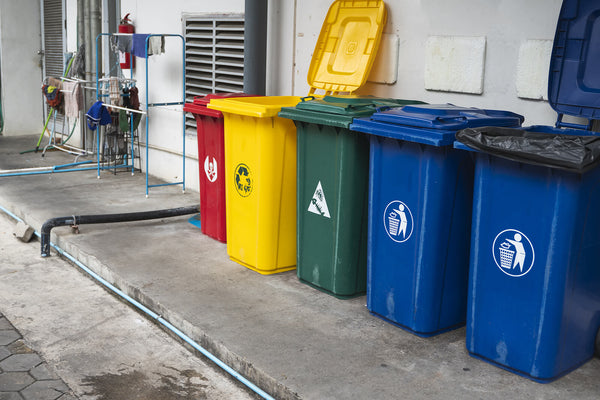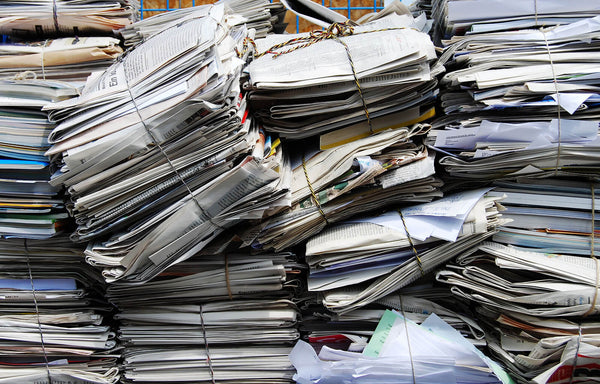Encouraging your staff to take recycling seriously can be challenging.
But given businesses are a significant contributor to the global waste problem, going greener will make a big difference to our planet and help your business save money.
Creating awareness of best recycling practices and coordinating recycling initiatives can reshape your office culture, so read on for some fantastic tips to help promote recycling in the workplace.
Do businesses have to recycle?
UK waste regulations require businesses to separate recyclable materials (glass, paper, and plastic) from other waste. Other responsibilities to be aware of include
- Producing, storing, transporting, and disposing of waste responsibly, so it won’t damage the environment or harm human health.
- Ensuring a waste transfer note covers every load of waste you send from your premises.
- Using a local authority or another licensed waste carrier to collect and remove your waste.
Even if your business outsources its waste to a waste management company, you still need to ensure it is dealt with responsibly. Failure to comply with these obligations can result in a fine or imprisonment.
Why recycling is important in the workplace
Workplace recycling comes with its challenges, so you and your employees need to do the right thing. Correctly disposing of waste the business produces gives everyone a sense of purpose and a feeling of togetherness.
As well as reducing your business carbon footprint and the amount of landfill tax you pay, impressive green credentials can also help you attract new customers and retain staff.
If your business isn’t recycling, you’ll miss out on many cultural, environmental, and financial benefits.
Benefits of recycling in the workplace
Showcasing the results of recycling workplace waste is an effective way to get staff motivated and on board with your ideas. Recycling has many benefits, some of which you and your team may have yet to consider.
Good for the environment
Creating less landfill waste, keeping local communities clean, conserving energy and natural resources, and preventing global warming are some positive environmental impacts fuelled by workplace recycling.
Whether it’s plastic bottles, paper supplies, food waste, or coffee cups, small changes to your company’s recycling habits can make a big difference to the planet.
Boosts brand reputation
Correctly recycling your workplace waste is excellent PR.
An in-depth survey of 2000 UK adults by Hearts & Science of 2000 adults revealed that 52% of consumers consider a brand’s eco-credentials when choosing products. This is proof that demonstrating a commitment to sustainability can give your business an edge over your competitors.
Saves money
Recycling improves resource efficiency by giving unwanted waste a new lease of life. Why not reuse cardboard boxes for your next shipment or rescue scrap paper for writing notes?
By not using materials unnecessarily, you will quickly reduce your waste disposal and waste management costs.
More jobs
An unsung benefit of work recycling is its positive effect on employment by generating job opportunities.. A report from thinktank Green Alliance suggests a fresh approach to recycling in the UK could create almost half a million jobs by 2035. From manufacturing facilities to collection roles, recycling is good for the entire economy.
What workplace waste can be recycled?
One of the biggest culprits of workplace waste is single-use items such as coffee, stirrers, plastic bottles and most product packaging.
The best way to improve your recycling rate is to choose products for your workplace made of recycled materials. Recyclable materials include aggregates, aluminium, cardboard, electronic equipment, glass, paper, textile, tyres, and wood.
Items such as glass can be endlessly recycled, as long as it doesn’t get contaminated, and components of your ageing IT can even be salvaged.
Many of these materials are highly energy-intensive, so keeping the product cycle alive longer is best. For example, it takes 500kWH of electricity to produce 200kg of paper, equivalent to continuously powering one computer for five months.
How to encourage recycling at work
As a business owner, you need to lead by example, motivating and educating your troops about the correct disposal of waste in the workplace.
Here are a few ways to get everyone to make a conscious effort to recycle:
Educate employees
Run workshops, hand out leaflets and hold meetings. Discuss the best recycling practices, the environmental impact of recycling, and the type of recyclable materials to avoid confusion. Regular communication and setting goals with your colleagues will fuel their motivation to participate.
Put up signs and reminders
Keep recycling at the forefront of your employee’s minds by following the initial implementation of your program.
Placing clear signs, colourful posters, and reminders around the workplace can be beneficial — make them from recycled materials for bonus points.
Recycling slogans for the workplace should be catchy and reinforce the importance of recycling.Something like “Make our planet a cleaner place to live. Recycle” or “Be the change you want to see in the world” hit the brief.
Make it competitive
Another brilliant recycling initiative at work is to add some friendly fire. Have departments or floors compete to produce the least waste or contamination. Think about individual challenges — zero-waste packed lunches, not using takeaway coffee cups, etc.
While a fun reward and coveted bragging rights will keep everyone committed to the cause, it’s also a great conversation starter to share ideas about recycling in the workplace and think about waste disposal behaviours.
Workplace recycling bins
To fully commit to a new recycling initiative, set up a recycling point with different coloured workplace recycling bins to encourage the segregation of waste materials.
Each bin colour denotes a specific rubbish stream — the colours used for the different types of recycling bins and waste bins can vary between businesses. However, if you need some guidance, these are the colours commonly used:
- Blue: paper and cardboard
- Green: Glass bottles and jars
- Red: Plastic bottles and packaging
- Black: Tins and cans
Don’t forget to remove individual bins that staff typically keep under their desk or beside their workstation.
Display the results of your company’s recycling progress near your recycling bins to keep everyone motivated.
While you may be passionate about recycling, many of your employees might not be. More and more businesses are concerned about protecting our planet and playing their part to contribute to a greener world and reducing any harmful impact on our natural environment.
If you’d like to recycle more of your workplace waste, contact Wheelie Bin Solutions today to find out how we can help.








Craig Pryce
With over 17 years of experience in the waste and recycling industry, Craig is passionate about making recycling easier and reducing the negative impact of litter. He has been the managing director of Wheelie Bin Solutions (WBS) since January 2016, and prides the company on his expert knowledge, top-quality products, and customer service. His proudest moment was when WBS supported the 2012 Olympic Games, working in partnership with Contenur UK to supply over 9000 bin containers to all Olympic venues. Craig is always keen to share his knowledge, so whether you need advice about the benefits of a wheelie bin lock, or ideas for alternative uses for your wheelie bin, Craig will ensure your recycling and waste disposal habits are gold medal worthy.